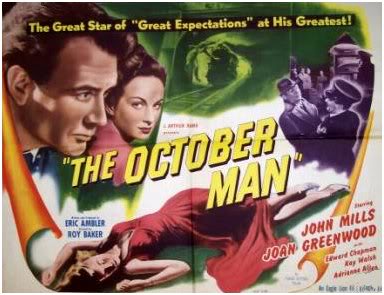 The only problem with a really crackerjack opening is that sometimes it can make the rest of a film seem staid.
The only problem with a really crackerjack opening is that sometimes it can make the rest of a film seem staid.
Roy Ward Baker’s The October Man, which was written and produced by spy novelist Eric Ambler, features a stunning, completely wordless opening sequence in which a bus full of passengers navigates twisting English country roads at night in the rain.
Jim Ackland (John Mills) sits next to a little girl. The two are friendly with each other, and he ties his handkerchief into a rabbit shape to amuse her. The film cuts from them to an axle under the bus with a loose screw, to the sleepy driver, and back to them. When disaster comes, it is swift.
Before the accident, Ackland had a good job as an industrial chemist and was quite sane. During the accident, however, he suffered a depressed fracture of the skull and multiple brain injuries.
The little girl on the bus next to him was the daughter of some of his friends, and he blames himself for her death, twice attempting suicide during his convalescence.
Eventually, though, Ackland starts to get his life back on track. He moves into a boarding house full of fusspots and weirdos and gets another job as a chemist. He meets a nice girl named Jenny Carden (Joan Greenwood) and starts seeing her regularly.
But when one of the other residents of Ackland’s boarding house — a woman named Molly Newman (Kay Walsh) — is murdered, suspicion falls on Ackland. The only person who should know beyond a shadow of a doubt whether he’s guilty or not — Ackland himself — isn’t even sure, since he’s a paranoiac who suffers from blackouts.
The October Man is a good film. It’s well acted and well shot, and the central mystery is intriguing, if not particularly difficult to unravel. My main problem with it is that nothing in the film is equal to the suspense and power of the first minute.
This was the first feature film that Roy Ward Baker directed. (He’s listed in the credits as “Roy Baker.”)
Baker was a prolific director of British film and television who worked into the 1990s, and who died last year at the age of 93. During World War II, Baker worked under Eric Ambler in the Army Kinematograph Unit, which eventually led to him directing The October Man. If you’re a fan of Hammer Studios’ horror films, you’ve doubtless seen films directed by Baker, but he worked in all manner of genres. His most enduring film is probably A Night to Remember (1958), about the sinking of the Titanic.
